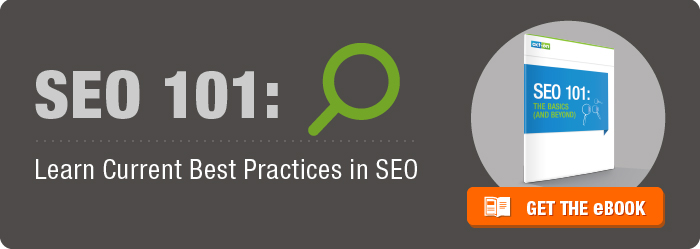5 Critical Rules for SEO Success in 2014

The major search engines win or lose market share by the quality of the results they deliver for searchers; this is why they continually fine-tune their algorithms to increase the quality of their organic results.
Such constant evolution makes it challenging for marketers to keep their search engine marketing practices up-to-the-minute, but the payback is worth the effort. Companies implementing SEO best practices see significant gains in new customers, thought leadership perception, and customer satisfaction. Those taking shortcuts pay a steep price in lessened search traffic and results.
Let's take a look at five key tactics that can boost your search engine optimization program, regardless of what tack the search engines take next.
1. Focus on Content (Because Content is Still King)
Many people ask, "How do I create content for Google or Bing?" That's the wrong question. You're not selling to search engines. You're creating content for your audience. Your goal is for your page to be the best possible page on the Internet for your target keyword. And to be the best possible page, it has to have the content that best fulfills the searcher's intent.
Obviously, we know that search engine optimization is important. You can't just write great content and expect people to come running. You have to optimize it so that Google (or another engine) can see how well your page answers a searcher's intent; their judgment will be rendered on the search engine results page. But you're always creating worthwhile content first. This has been true since Day One, and will always be true.
2. Write for Your Audience
Know who your buyers are, and keep those personas in mind. When you create content for actual customers and prospects and you base your decisions on what's best for them and what you know they will look for, you'll probably rank well. If you try to game the system, you will eventually fail. Google's algorithms are designed to help people find the best possible search result, partly by finding and devaluing low-quality content:
- Panda detects low-quality and duplicate content
- Penguin devalues link spam
And partly by improving so-called semantic search results:
- Hummingbird is a bid for understanding natural language and the context of queries
To create content that speaks to your audience, you need to research keywords to find the ones they're using: Which language? What kinds of phrases? Then you need to create content based on that insight, using the words your searchers would use. Don't overlook asking your current customers how they performed searches to find you to begin with. Review your own site search to see what keywords people use once they find your site.
3. Speak Their Language
It's important to know who your searcher is, what they're looking for, and why they're looking. Are they seeking a general category of information? Are they just learning or ready to buy? This information will direct your content development.
Compile a definitive list of keywords or phrases using external keyword databases, internal site search logs, and by asking your customers how they would find a specific product or category. Then, map your important keywords to pages on your site. Look at each page and determine which words are relevant. Are you actually using these words? Try searching your own site. If you can't find them, search engines won't, either.
And don't ignore the long tail. Phrases that are five to seven words long are often less competitive and better quality. For example, someone's search for "computer," doesn't tell you anything, but when someone searches for "where to buy a gaming computer in San Francisco" you know a lot, including that this someone may be fairly close to being ready to buy.
4. Optimize Across the Site
When optimizing content on your website, don't overdo it. Use natural language to communicate your message, including synonyms and varying word order. Longer copy provides a better opportunity for keyword placement that sounds natural. It also allows you to provide more information to your visitors. Choose one keyword phrase (only!) for each page on the site and include each phrase three or four times in your copy.
Remember to put your keywords in the:
- Title tag
- Page URL
- Headlines and sub-headlines (H1 & H2 tags)
- Call-to-action links (hyperlinks)
- Meta description
Be aware that using the exact term matters. "Symptoms of diabetes" is not the same as "diabetes symptoms." Synonyms are good and help create richer content and context, but exact match text is preferable for the points noted above. Exact match should also show up in the main body text copy, top to bottom, as it naturally can occur. Don't stuff it in where it doesn't fit.
5. Get Quality Links
The more useful content you have, the greater the chances someone else will deem that content valuable to their readers and link to it. If you want to get great links, create great content. Mentions in news articles and social media are more ways to get linked. When you find links to your site that are broken, contact those linking sites and suggest they re-link to your content.
Use and grow your network. People are more likely to link to people they know. What doesn't work? Going out and buying links. If you have to pay somebody to link to you, it's probably not a good idea. My best advice is to go after links you would want to get, even if Google wouldn't give you any credit for them. And don't forget about internal links. These help the reader navigate through your site, and show the search engines the relationship between your site and your pages, which (if you have good content) should be strong and healthy.
True North
No matter what changes the search engines make, there is one tried-and-true, evergreen method to optimize your search engine results: Focus on your reader. Content, images, links; all should be created for the reader's benefit. This is the gold-standard strategy that will protect you, always, from whatever cold winds may blow from search engines. Who says all good deeds must be punished?
Read this SEO 101: the Basics (and Beyond) to get even more insights for creating and optimizing content for search engines, and - more importantly - for your future customers.
Author Bio: Martin Laetsch, director of online marketing for Act-On, is a search engine marketing pioneer. He built one of the first global search marketing organizations, for Intel, and is nationally recognized as an SEO speaker and thought leader. He has also developed and commercialized products that have propelled growth for Fortune 500 companies and small businesses.









